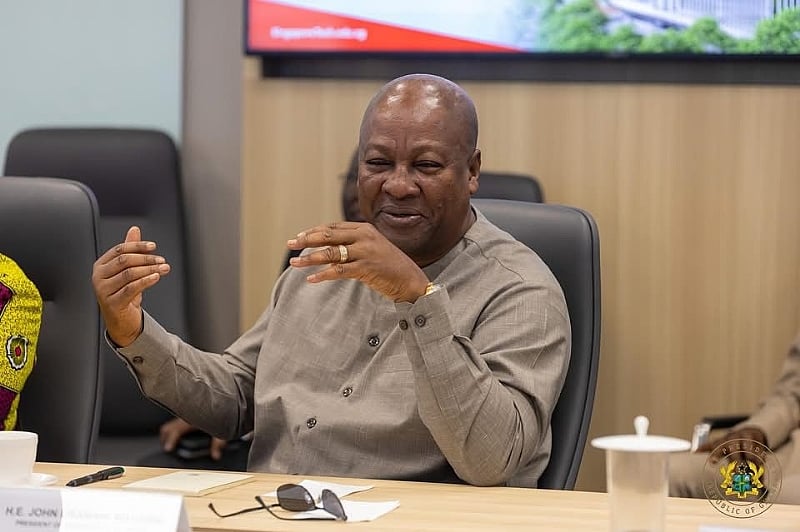President John Dramani Mahama’s recent visit to Singapore has underscored the critical need for a paradigm shift in Ghana’s educational landscape, emphasizing a closer alignment between academic institutions and industry demands. During his engagement at the Africa Singapore Business Forum and subsequent visit to the Singapore Institute of Technology (SIT), President Mahama observed firsthand the effectiveness of Singapore’s applied-learning model, a system that seamlessly integrates theoretical knowledge with practical, industry-relevant experience. He advocated for Ghana to adopt similar strategies to better equip its graduates for the complexities and evolving needs of the modern job market. This approach, he argues, is essential for fostering a workforce that is not only job-ready but also future-ready, capable of adapting to the rapid technological advancements and dynamic shifts characterizing the global economy.
The cornerstone of President Mahama’s proposition lies in the concept of bridging the gap between academia and industry. He highlighted SIT’s innovative model, where work experience is embedded directly within the curriculum, as a prime example of how this can be achieved. This integrated approach exposes students to real-world challenges and provides them with practical skills and hands-on experience highly valued by employers. Furthermore, the emphasis on applied research with a demonstrable business impact ensures that academic endeavors are not confined to theoretical pursuits but are actively contributing to solutions for real-world problems, driving innovation and economic growth. This synergistic relationship between universities and businesses creates a mutually beneficial ecosystem where industries gain access to a pipeline of skilled talent, and universities receive valuable feedback to refine their curriculum in line with industry demands, thereby enhancing the relevance and marketability of their graduates.
President Mahama’s vision extends beyond simply integrating work experience into academic programs. He stressed the importance of aligning academic endeavors with national priorities to address critical challenges and foster sustainable development. He advocated for promoting applied learning, internships, and targeted programs that focus on areas crucial for Ghana’s socio-economic progress. By prioritizing these areas, universities can contribute directly to national development goals while ensuring that graduates possess the specialized skills and knowledge required to contribute meaningfully to these sectors. This strategic alignment of academic pursuits with national needs is crucial for maximizing the impact of educational investments and fostering a workforce capable of driving economic growth and societal advancement.
The President further championed the strengthening of public-private partnerships, particularly in rapidly evolving fields like life sciences and biotechnology. These sectors hold immense potential for innovation and economic development, and fostering collaborative initiatives between public institutions and private enterprises can accelerate progress and create new opportunities for growth. By leveraging the resources and expertise of both sectors, Ghana can establish a thriving research and innovation ecosystem that drives technological advancements, creates high-value jobs, and improves the overall quality of life for its citizens. These partnerships can also facilitate the transfer of knowledge and technology, enabling Ghanaian industries to adopt cutting-edge practices and compete effectively on a global scale.
Central to President Mahama’s vision is the reorientation of research priorities towards finding solutions that not only generate employment but also improve the lives of Ghanaians. He advocates for a shift away from purely theoretical research towards applied research that addresses practical challenges and translates into tangible benefits for society. This focus on impactful research ensures that academic efforts contribute directly to solving real-world problems, such as improving healthcare outcomes, enhancing agricultural productivity, developing sustainable energy solutions, and addressing environmental challenges. By directing research efforts towards these areas, universities can play a pivotal role in driving social progress and improving the well-being of communities across the country.
In essence, President Mahama’s call for greater collaboration between universities and industry represents a comprehensive approach to transforming Ghana’s educational system. By adopting the principles of applied learning, aligning academic programs with national priorities, fostering public-private partnerships, and prioritizing impactful research, Ghana can cultivate a highly skilled and adaptable workforce capable of driving economic growth, fostering innovation, and addressing critical societal challenges. This transformation will not only enhance graduate employability but also contribute to building a more resilient and prosperous future for Ghana. The key takeaway from the Singaporean model is that a dynamic interplay between academia and industry is essential for creating a robust and responsive educational system that equips graduates with the knowledge, skills, and experience needed to thrive in an increasingly competitive global landscape.


